The Global Public-Private Partnership (G3P) is a worldwide network of stakeholder capitalists and their partners. This collective of stakeholders (the capitalists and their partners) comprises global corporations (including central banks), philanthropic foundations (multi-billionaire philanthropists), policy think tanks, governments (and their agencies), non-governmental organisations, selected academic and scientific institutions, global charities, labour unions and other chosen “thought leaders.”
The G3P controls global finance and the world’s economy. It sets world, national and local policy (via global governance) and then promotes those policies using the mainstream media (MSM) corporations, which are also “partners” within the G3P.
Often those policies are devised by the think tanks before being adopted by governments, which are also G3P partners. Government is the process of transforming G3P global governance into hard policy, legislation and law.
Under our current model of Westphalian national sovereignty, the government of one nation cannot make legislation or law in another. However, through global governance, the G3P creates policy initiatives at the global level, which then cascade down to people in every nation. This typically occurs via an intermediary policy distributor, such as the IMF or IPCC, and national government then enact the recommended policies.
The policy trajectory is set internationally by the authorised definition of problems and their prescribed solutions. Once the G3P enforces the consensus internationally, the policy framework is set. The G3P stakeholder partners then collaborate to ensure the desired policies are developed, implemented and enforced. This is the oft-quoted “international rules-based system.”
In this way, the G3P controls many nations at once without having to resort to legislation. This has the added advantage of making any legal challenge to the decisions made by the most senior partners in the G3P (it is an authoritarian hierarchy) extremely difficult.
The G3P has traditionally been referenced in the context of public health— specifically in United Nations documents, including documents from UN agencies such as the World Health Organisation (WHO). The WHO’s 2005 document Connecting For Health, in noting what the Millennium Development Goals meant for global health, revealed the emerging G3P:
“These changes occurred in a world of revised expectations about the role of government: that the public sector has neither the financial nor the institutional resources to meet their challenges, and that a mix of public and private resources is required. [. . .] Building a global culture of security and cooperation is vital. . . . The beginnings of a global health infrastructure are already in place. Information and communication technologies have opened opportunities for change in health, with or without policy-makers leading the way. [. . .] Governments can create an enabling environment, and invest in equity, access and innovation.”
The revised role of governments meant that they were no longer leading the way. The traditional policy-makers weren’t making policy anymore; other G3P partners were. National governments had been relegated to creating the G3P’s enabling environment by taxing the public and increasing government borrowing debt.
This is the debt owed to the senior partners in the G3P. They are not only creditors, these same partners are also the beneficiaries of the loans. They use this comically misnamed “public investment” to create markets for themselves and for the wider G3P stakeholders.
In February 2000 researchers Kent Buse and Gill Walt of the George Institute for Global Health, wrote an official history of the development of the G3P concept. They suggested the G3P was a response to growing disillusionment in the UN project as a whole as well as an emerging realisation that global corporations were increasingly key to policy implementation. This correlates to the development of the stakeholder capitalism concept, first popularised in the 1970s.
Buse and Walt explained how G3Ps are designed to facilitate the participation of new breed of corporations. These entities recognised the folly of their previously destructive business practices. They were ready to own their mistakes and make amends. They decided they would achieve this by partnering with government to solve global problems. These existential threats were defined by the G3P and by the scientists, academics and economists the G3P selected and funded.
The two researchers identified a key Davos address, delivered by the UN’s then-Secretary-General Kofi Annan to the WEF in 1998, as marking the transition to a G3P-based global governance model:
“The United Nations has been transformed since we last met here in Davos. The Organization has undergone a complete overhaul that I have described as a ‘quiet revolution.’ [. . .] A fundamental shift has occurred. The United Nations once dealt only with governments. By now we know that peace and prosperity cannot be achieved without partnerships involving governments, international organizations, the business community and civil society. . . . The business of the United Nations involves the businesses of the world.”
Buse and Walt claimed that this shift signified the arrival of a new type of responsible global capitalism. But, as we shall see, that is not how the corporations viewed this arrangement. Indeed, Buse and Walt acknowledged why the G3P was such an enticing prospect for the global giants of banking, industry, finance and commerce:
“Shifting ideologies and trends in globalization have highlighted the need for closer global governance, an issue for both private and public sectors. We suggest that at least some of the support for G3Ps stems from this recognition, and a desire on the part of the private sector to be part of global regulatory decision-making processes.”
The conflict of interest is obvious. We are simply expected to accept, without question, that global corporations are committed to putting humanitarian and environmental causes before profit. Supposedly, a G3P-led system of global governance is somehow beneficial for us.
Believing this requires a considerable degree of naïveté. Many of the G3P’s stakeholder corporations have been convicted, or publicly held accountable, for the crimes they have commited. These include war crimes. The apparently passive agreement of the political class that these “partners” should effectively set global policy, regulations and spending priorities seems like infantile credulity.
This naïveté is, in itself, a charade. As many academics, economists, historians and researchers have pointed out, corporate influence, even dominance of the political system, had been increasing for generations. Elected politicians have long been the junior partners in this arrangement.
With the arrival of G3Ps, we witnessed the birth of the process that formalised this relationship—that created a cohesive world order. The politicians didn’t write the script; they have simply stuck to the script ever since.
It is important to understand the difference between “government” and “governance” in the global context. Government claims the right, perhaps through a quasi-democratic mandate, to set policy and decree legislation (law).
The alleged Western representative democracies, which aren’t democracies at all, practice a model of national government where elected representatives form the executive branch which presents and ultimately enacts legislation. For example, in the UK this is achieved through the parliamentary process.
Perhaps the closest thing to this form of national government on an international scale is the United Nations General Assembly. It has a tenuous claim to democratic accountability and can pass resolutions which, while they don’t bind member states, can create “new principles” that may become international law when later applied by the International Court of Justice.
However, this isn’t really world “government.” The UN lacks the authority to decree legislation and formulate law. The only way its “principles” can become law is via judicial ruling. The non-judicial power to create law is reserved for governments, and their legislative reach only extends to their own national borders.
Due to the often-fraught relationships between national governments, world government starts to become impractical. Given both the nonbinding nature of UN resolutions and the international jockeying for geopolitical and economic advantage, there isn’t currently anything we could call a world government.
There is the additional consideration of national and cultural identity. Most populations aren’t ready for a distant, unelected world government. People generally want their nations to be sovereign. They want their federal representatives to have more democratic accountability to constituents, not less.
The G3P would certainly like to run a world government, but imposing such a system by overt force is beyond their capability. Therefore, they have employed other means, such as deception and propaganda, to promote the notion of global governance.
Former Carter administration adviser and Trilateral Commission founder Zbigniew Brzezinski recognised how to make this approach easier to implement. In his 1970 book Between Two Ages: Americas Role In The Technetronic Era, he wrote:
“Though the objective of shaping a community of the developed nations is less ambitious than the goal of world government, it is more attainable.”
The last 30 years have seen numerous G3Ps form as the concept of global governance has evolved. A major turning point was the WEF’s conspectus of multistakeholder governance. With its 2010 publication of Everybody’s Business: Strengthening International Cooperation in a More Interdependent World, the WEF outlined the elements of G3P stakeholders’ form of global governance.
Global Agenda Councils were established to deliberate and suggest policy covering practically every aspect of our existence. The WEF created a corresponding global governance body for every aspect of society. Nothing was left untouched: values, security, public health, welfare, consumption of goods and services, access to water, food security, crime, rights, sustainable development, global economic, financial and monetary systems.
WEF Executive Chairman Klaus Schwab spelled out the objective of global governance:
“Our purpose has been to stimulate a strategic thought process among all stakeholders about ways in which international institutions and arrangements should be adapted to contemporary challenges. [ . . .] [T]he world’s leading authorities have been working in interdisciplinary, multistakeholder Global Agenda Councils to identify gaps and deficiencies in international cooperation and to formulate specific proposals for improvement. [ . . .] These discussions have run through the Forum’s Regional Summits during 2009 as well as the Forum’s recent Annual Meeting 2010 in Davos-Klosters, where many of the emerging proposals were tested with ministers, CEOs, heads of NGOs and trade unions, leading academics and other members of the Davos community. [ . . . ] The Global Redesign process has provided an informal working laboratory or marketplace for a number of good policy ideas and partnership opportunities. [ . . . ] We have sought to expand international governance discussions [ . . . ] to take more pre-emptive and coordinated action on the full range of risks that have been accumulating in the international system.”
By 2010 the WEF had begun what it called a “Global Redesign” process, in which it defined the international challenges and proposed solutions. Fortunately for the G3P, these proposals meant more control and partnership opportunities. The WEF sought to spearhead the expansion of this international governance.
Here is one example: In 2019 the UK Government announced its partnership with the WEF to develop future business, economic and industrial regulations. The UK government was committed to supporting a regulatory environment created by the global corporations, who would then be regulated by the same regulations they had themselves designed.
The WEF does not have an electoral mandate of any kind. None of us have any opportunity to influence or even question its judgments. And yet it is working in partnership with our supposedly democratically elected governments, as well as with other G3P stakeholders, to redesign the planet we all live on.
Stakeholder capitalism lies at the heart of the G3P. Essentially, the G3P usurps democratic government (or indeed government of any kind) by placing global corporations at the centre of decision-making. Despite deriving authority from no one but themselves, the leaders of the G3P assume their own modern interpretation of the “divine right of kings” and rule absolutely.
In January 2021 the WEF spoke about how it views Stakeholder Capitalism:
“The most important characteristic of the stakeholder model today is that the stakes of our system are now more clearly global. [ . . . ] What was once seen as externalities in national economic policy making and individual corporate decision making will now need to be incorporated or internalized in the operations of every government, company, community, and individual. The planet is [ . . . ] the center of the global economic system, and its health should be optimized in the decisions made by all other stakeholders.”
The G3P will oversee everything. That includes every government, all business, our so-called communities (where we live) and each of us individually. Human beings are not the priority. The priority is the planet. Or so the WEF claims.
Centralised control of the entire planet—all its resources and everyone who lives on it—is the core ethos of the G3P. There is no need to interpret G3P intentions. We don’t have to read between the lines. It is stated plainly in the introduction to the WEF’s Great Reset initiative:
“To improve the state of the world, the World Economic Forum is starting The Great Reset initiative. [ . . . ] The Covid-19 crisis [ . . . ] is fundamentally changing the traditional context for decision-making. The inconsistencies, inadequacies and contradictions of multiple systems – from health and financial to energy and education – are more exposed than ever. [ . . . ] Leaders find themselves at a historic crossroads. [ . . . ] As we enter a unique window of opportunity to shape the recovery, this initiative will offer insights to help inform all those determining the future state of global relations, the direction of national economies, the priorities of societies, the nature of business models and the management of a global commons.”
It should be noted that the WEF is just one partner organisation among many in the G3P. However, it has been perhaps the most influential in terms of public relations throughout the pseudopandemic. Contrary to the hopes of researchers Buse and Walt, we see an emergent global, corporate dictatorship that cares not one whit about truly stewarding the planet.
The G3P will determine the future state of global relations, the direction of national economies, the priorities of societies, the nature of business models and the management of a global commons. There is no opportunity for any of us to participate in either their project or the subsequent formation of policy.
While, in theory, governments do not have to implement G3P policy, in reality they do. Global policies have been an increasing facet of our lives in the post-WW2 era. The mechanism of translating G3P policy initiatives, first into national and then regional and eventually local policy, can be clearly identified by looking at sustainable development.
In 1972 the privately funded independent policy think tank Club of Rome (CoR) published The Limits to Growth. As we saw with the roll-out out of the pseudopandemic, the CoR used computer models to predict what it decreed were the complex problems faced by the entire planet: the “world problematique.”
The opinions offered by the CoR derived from the commissioned work of the Massachusetts Institute of Technology’s (MIT’s) system dynamic “World3 model.” This model assumed that the global population would deplete natural resources and pollute the environment to the point where “overshoot and collapse” would inevitably occur.
This is not a scientific “fact” but rather a suggested scenario. So far, none of the predictions made by the World3 model have come to pass.
The scientific and statistical to-and-fro on the claims made in The Limits to Growth has been prolific. However, ignoring all doubts, the World3 model was firmly planted at the centre of the sustainable development policy environment.
In 1983 the Brundtland Commission was convened by former Norwegian Prime Minister Gro Harland Brundlandt and then-Secretary-General of the UN Javier Pérez de Cuéllar. Brundtland was a member of the Club of Madrid think tank and Pérez de Cuéllar a Club of Rome member. Based upon the highly questionable assumptions in the World3 model, they set about uniting governments from around the world to pursue sustainable development policies.
In 1987 the Commission published the Brundtland Report, also known as Our Common Future. Central to the idea of sustainable development, as outlined in the report, was population control (reduction). This policy decision to get rid of people won international acclaim and awards for the authors.
The underlying assumptions for these policy proposals weren’t publicly challenged at all. Though an academic and scientific debate raged, it remained almost completely unreported. As far as the public knew, what were no more than unscientific assumptions and speculations were proven facts. It is now impossible for any of us to question these unproven assumptions and obviously inaccurate models without being accused of “climate denial.”
From the Brundtland Report emerged the Millennium Development Goals, which in 2015 gave way to the United Nation’s full adoption of Sustainable Development Goals (SDGs). Since then, these SDGs have been translated into government policy in country after country. For example, in 2019 the UK government proudly announced its Net Zero policy commitment to sustainable development goals.
SDGs had already been making an impact at the regional and local levels in counties, cities, towns and boroughs across the UK. Now nearly every council across the country has a “sustainable development plan.”
Regardless of what you think about the global threats we may or may not face, the origin and the distribution pathway of the resultant policy is clear. A privately funded, globalist think tank was the driver of a policy agenda which led to the creation of a global policy framework, which has been adopted by governments the world over, and which has impacted communities in nearly every corner of the Earth.
SDGs are just one among numerous examples of G3P global governance in action. Elected politicians’ role in this process is negligible. They merely serve to implement and sell the policy to the public.
It doesn’t matter who you elect, the policy trajectory is set at the global governance level. This is the dictatorial nature of the G3P and nothing could be less democratic.
****************************
Many thanks to Richard D. Hall who first came up with the idea of the G3P chart, outlined in my book Pseudopandemic. You can watch my discussion with Richard here.
By request, here is a white background version of the G3P image which should save on printing costs for those who wish to download and print it.

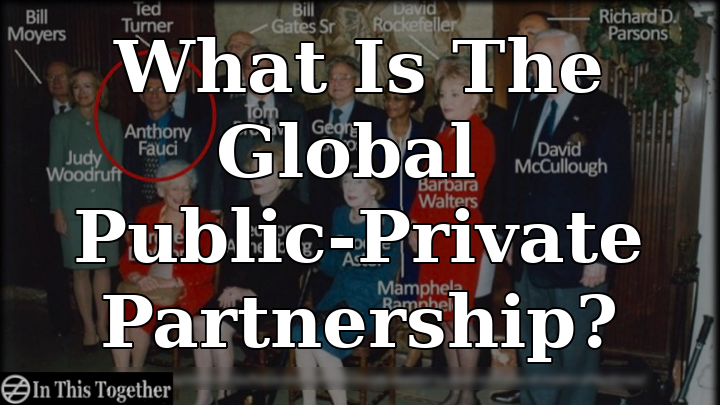
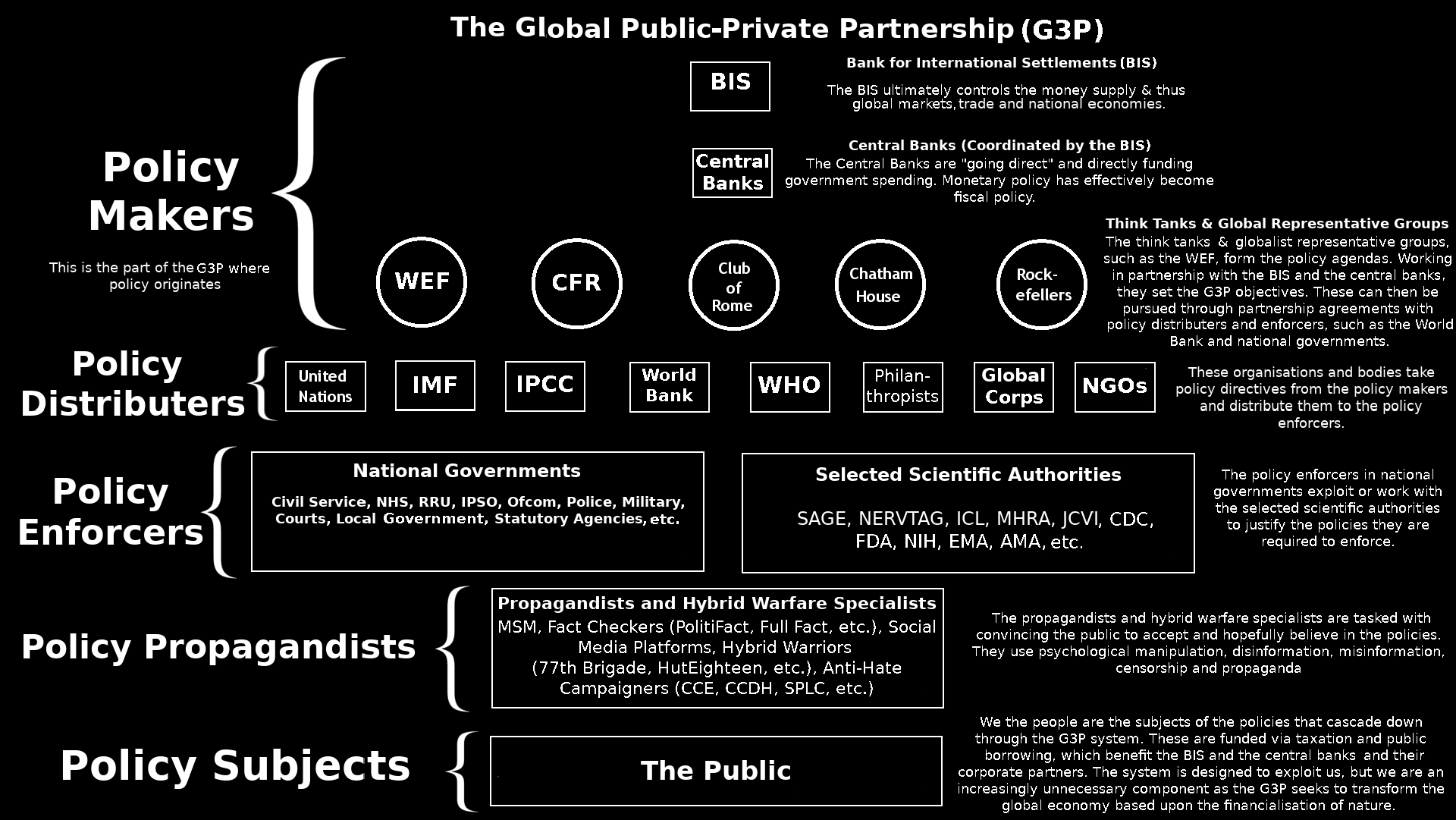
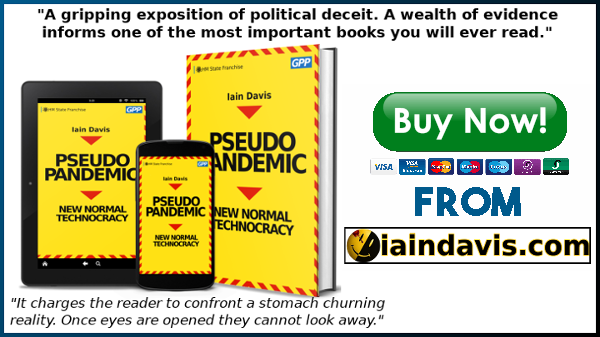
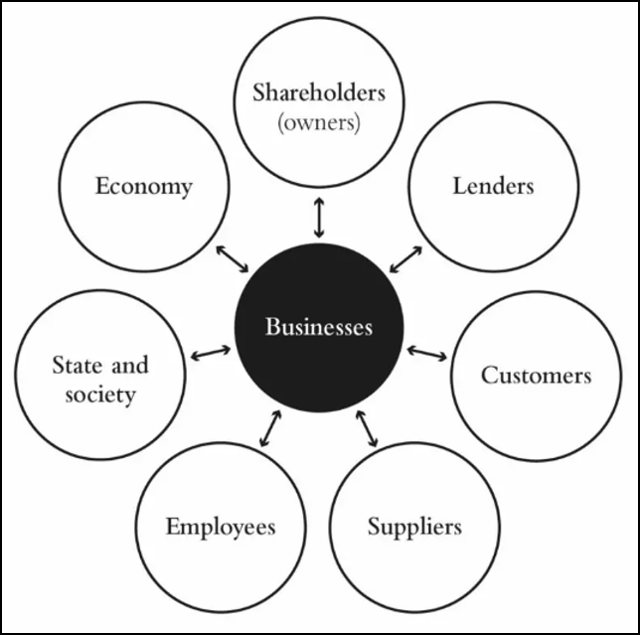
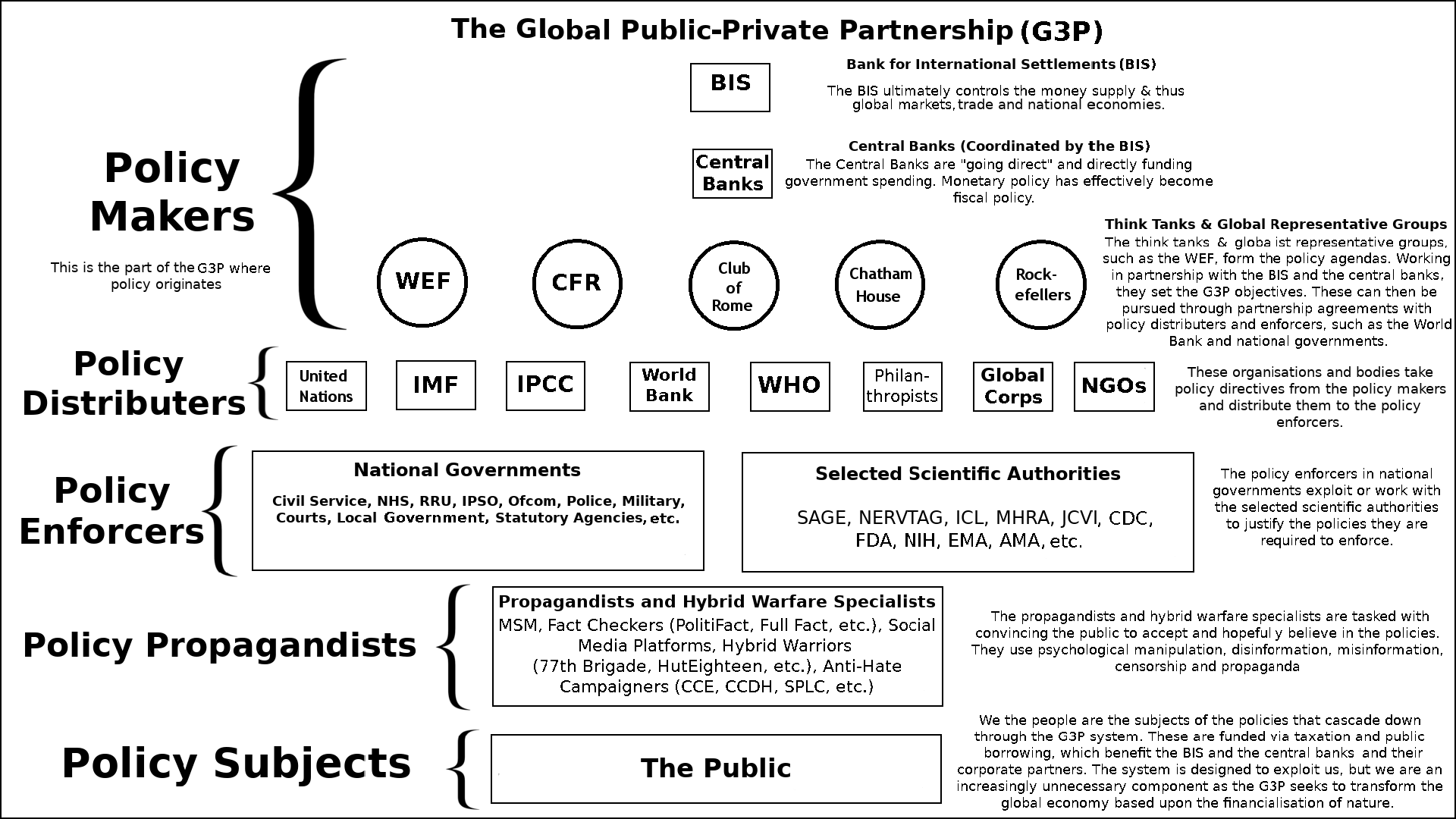
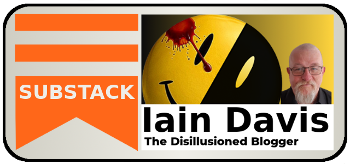

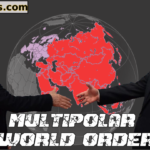

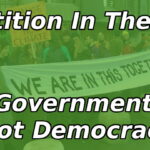
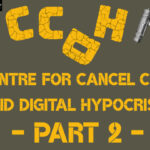
Great article! People really need to understand that Covid is merely the figleaf to impose a communisim 2.0 of sorts resulting in a drastic transformation of our economic and financial systems. Net-Zero and Covid restrictions share similar aims in conditioning us to accept restrictions to our rights to freely move, transact and associate all under the guise of environmental/medical ‘existential crises’. Totalitarianism comes in tip-toes, not strides….
Glad you found it useful Omar.
Wonderfully clear, and enlightening, description/explanation of the global governance phenomenon. Thank you very much.
You’re welcome Olivia
Hi,Ian, is your main issue with GPPPs the democratic deficit or is it the depopulation/ eugenics angle? The reason I raise the question is because a lot of people don’t care about democracy as long as the lights stay on, food is available etc.
An existential threat is the only thing that will make most people take a stand against GPPPs and any malign agenda they might have.
I think my main issues is neo-feudal enslavement. I guess totalitarianism and technocracy, closely followed by the biosecurity state. I think this infers both the end of democracy as we understand it (representative democracy) and an existential threat. However, while I think a eugenics depopulation agenda is in play, I feel we are facing extinction of the species via transformation. Schwab’s Fourth Industrial Revolution of transhumansim. I think it entirely possible, as you alluded to, that many people will accept this transformation. I don’t think we face the “end of days” but rather technocratic enslavement and depopulation (probably via reduced fertility) and transformation into a new species.
Policy Makers = true government. National governments = enforcers aka police aka police State governments
The WHO: “These changes occurred in a world of revised expectations about the role of government: that the public sector has neither the financial nor the institutional resources to meet their challenges, and that a mix of public and private resources is required……Building a global culture of security and cooperation is vital” to getting rid of democracy and sidelining voters and the general public so that we can have the world – a new feudalism – that ‘we’ want.
Thanks Arby. Yes, it seems that way.
I was looking for the pdf but do not see it.
Sorry about the delay Joe. It is now available.
This article can only be fully understood if one knows that the true capitalists are the jewish bankers, exactly the same ones who are communists. Communism is jewish, so for a long time that they’ve been using the hegelian dialect of balance of powers to divide nations and people and to keep them distracted with illusions. They call themselves ‘internationalists’ and are the only people on earth having a “Great Plan” to establish a global dictatorship, which hey call it an “Universal Republic”.
As for the rest, the article is good!!!
Thanks Luis. I don’t agree with your assessment. For example, Communism certainly isn’t “jewish” in my view. I would be interested to know why and how you have come to that conclusion. What is the evidence informing your view?
Yet another excellent appraisal of the GPPP Iain. Perhaps it should be renamed GTTT, Global Tyrannical Takeover Trajectory.
It does seem unstoppable and leaves me with anxiety about the rapidly rolling out agenda, yet there must be many things we as the seemingly powerless billions, can do. Solutions please…..EVERYONE!
My little contribution is…
STOP USING THE CREDIT CARD!
KEEP THE CASH ECONOMY THRIVING.
Many thanks for the PDF implementation Iain. I am already stockpiling Mercola PDFs….this information must be in the hands of the people when the inevitable Internet Reset is thrust upon us.
We really are way behind in our SHTF strategies.
Thanks Aodh. Your suggested solutions are exactly the kind of solutions we need. Here’s my take on it: – https://iaindavis.com/inalienable-rights/
Great article in the sense of analysis, Respresents a good starting point for thinking of the survival path. The curse of Financialization, Rent seeking, Monopolization, Absentee Ownership, Conspicuous Consumption need to be included. Contributions of Sheldon Woli (Political Philosophy), Michael Hudson (Political Economy)are vital. The path of survival, I think, leads to a fight for national sovereignity and personal sovereignity with a Life Paradigm, humanism.
Thanks Blaz.
Humanism is a false religion. It has no authoritative power other than consensus for practical utility. It fails to give life objective meaning and has no defense against denial of human exceptionalism.
Great analysis as usual Iain!
You are not alone, the former PM of the Czech Republic Vaclav Klaus has taken a high profile stand against globalist Covidism? He was even fined for not wearing a mask last year: https://en.wikipedia.org/wiki/V%C3%A1clav_Klaus#Breach_of_Covid-19_regulations
He was also highly suspicious of the Climate Change Agenda and even wrote a book on the dangers to democracy and independent scientific inquiry: https://www.pdfdrive.com/blue-planet-in-green-shackles-what-is-endangered-climate-or-freedom-e188841605.html
The following is an extract from his speech in Istanbul in July this year:
“The widespread acceptance of the ideology I call covidism has been orchestrated by irresponsible, short-term effects maximizing politicians and their very often self-selected and self-appointed “experts”. I mention this because the misuse of science and pseudoscience has been one of the important tools of manipulation in the corona crisis, used for the imposition of measures that radically undermine our freedom. Ordinary people are neither able nor willing to effectively oppose it because they are naturally frightened by the shocking possibility that the global ruling class and its experts could be fundamentally and intentionally wrong.”
“I used the term global ruling class. We may also speak of the global nomenclatura, or perhaps the Davos men (who are sitting not only in Davos, but also in Brussels, London, New York and elsewhere, I just hope not in Istanbul or Ankara). This self-serving supranational nomenclatura has many critics in your part of the world, and I am fully on your side in this respect.”
Source: https://www.klaus.cz/clanky/4776
Thanks vma. Useful links. Much appreciated.
Iain, you are brilliant. This is so clear, dispassionate and irrefutable. Essential reading. Will be sending to my dad, and that says a lot. Oh, I noticed one typo “In the 1972 the”. Thanks!!
You might like my piece, coming from a very different angle: https://reportingforbeauty.substack.com/p/ourpsychopathproblem
Cheers Tim. I am far from brilliant but I’ll accept the kind praise with gratitude. Your article is excellent mate. Flying monkeys? Like it. They get my ire. At least the parasites are openly hostile. The Flying Monkey’s unjustified superiority, certainty and passive aggressiveness really gets my goat. I think there is also a class analysis to be made around where people stand on COVID.
Just a quick social experiment I found quite funny. Go into Aldi and see how many mask wearers there are and then go into Waitrose. – Contrast and compare.
Hi Lain. I think you do an excellent job there of portrying the framework the parasite class have constructed over time and from whithin which they are now controlling Globally.
In Orwellian terms the moment in time within this dimension that we are all bearing witness too at present is the moment the boot is in motion, slowly exerting its weight onto the face of humanity. This motion does not stop, ever.
At least that is the intention of the parasite class.
I believe humanity is part of something bigger, much bigger, everything you might say. Some parts of humanity are attracted to the dark and indeed may be infested with dark inside. Who knows, they might, at the very core of the parasite class, be a physical manifestation of this dark? But I believe in truth we’re all part of an energy. The very notion that one part of this conscious energy can claim ownership over another part of conscious energy, and indeed wish to control the whole of the conscious energy, is abundantly obsurd. Even if it succeeds on a superficial level in this dimension of space and time I don’t believe it can succeed in terms of the whole. In essence they only have control because they say they do. This doesn’t mean anything, although within this dimension in space and time it kinda means everything. Ultimately, worse case scenario, maybe the end of humanity itself.
This is obviously not a desirable outcome for humanity but in this reality that possible future reality may well exist.
Whatever our perception of reality what is true is there are hundreds of millions of us Worldwide that see that reality is under attack.
You are clearly one of those people Lain and thankyou for spreading awereness of this attack. The more people that are aware, whatever the soltions may be, the better chance we have of stopping this evil.
Thanks lookofeagles. I think we have every chance of success if we realise how and why we are under attack and who is behind it. My tiny role in this effort is just to keep providing the evidence where I find it. Glad you find the site useful.
Hello Ian,
I was trying to Donate via Paypal on this page: https://iaindavis.com/donorsupport/ but the link just redirect me to the main Paypal page. I was wondering if your Paypal is still active or if there is an issue with the link.
Keep up the good work,
Thomas
Many thanks I need to fix that.
Catching up on my reading, but found it curious that this article popped up in my news app.
https://granthshala.com/department-of-labor-proposes-rule-to-add-political-directives-to-retirement-savings/
Thanks Kelly. Very interesting article.
Thanks for the download, Iain. I saw an interview with you a couple weeks ago – glad you’re getting this message out. This is certainly pre-planned. I had a conversation with a two-time Thinker-50 list member in 2019 who said that global governance is the future, that we should be looking at the China model. Not sure if this was a supportive contention or not, but the person studies the elites. The person also said there is a plan already to Balkanize N. America. Finally, given what we’ve seen lately with the garbage statistical models of the Ferguson’s of the world, the person also said such information/models, despite being so prevalent, was actually irrelevant and useless.
Thanks for the fascinating insight David. It is most certainly planned.
CV-19 is of course the tool chosen to advance the Great Reset. In fact, the scientists “create” the virus by PCR: They take artificial and entirely hypothetical primers (previously existing genetic sequences available in genetic banks) and put them in touch with the supernatant of the pharyngeal or broncho-alveolar fluid of the patient, that is with tens of billions of RNA and DNA molecules; and if, as it is likely, the primers attach to something in that broth, they conclude that whatever attached to the primers, then forming a DNA molecule with the help of the enzyme reverse transcriptase, it is the new and unknown SARS-CoV-19 As if that weren’t enough, the primers used are just an infinitesimal fragment of the alleged genome of the virus; they are in fact made up of only 18 to 24 bases (nucleotides) each; while the SARS-CoV-2 virus is assumed to consist of 30,000 bases, that is to say the primers represent only 0.07 percent of the virus genome. How is it possible to select the specific virus you are looking for with such a minute sequence…” Source: Virus Mania-Book.
Thanks Charles. This is something I covered in detail in an earlier posts that might interest you: – https://iaindavis.com/covid-19-evidence-of-global-fraud/
This is an impressive and comprehensive explanation of GPPP and how it undermines national sovereignty and advances the agenda of The Great Reset.
I was disheartened to see the hateful comment that attributed Communism and, by association, globalism with Jews. This is an uninformed comment. A list of some of the most destructive Communists in the world – Stalin, Mao Zedong, Deng Xiaoping, Josip Tito, Fidel Castro – to name a few puts paid to that being a blood libel. When it comes to the globalist agenda to bring about the New World Order, Klaus Schwab, Bill Gates, Hansjorg Wyse, Warren Buffett, the Rockefellers, the Fords, etc. can hardly be slurred as “Jewish.”
As a Christian, I’m indebted to our Jewish brethren. They gave us our Savior, who was born and died a Jew, the Bible, the Ten Commandments and our religious foundation.
The individual who engaged in Jew hatred is perpetrating evil lies and needs to study history.
I couldn’t agree more. I see no evidence at all of a “jewish plot.” Of course many powerful individuals both today and throughout history have been jewish. But many are Catholics, Protestants, Muslims and Hindus etc. I find the jewish cabal rhetoric thing tiring and, as you say, historically ignorant.
Are you aware that there is a difference between Hebrew Jews of the Levant and Ashkenazi Jews from Khazaria?
https://concisepolitics.com/2015/07/25/rothschild-empire-a-long-history-of-many-scams/
In case you’re not familiar with the origin and history of the Ashkenazi Jewish people, the following articles provide a good accounting:
https://themillenniumreport.com/2019/08/the-hidden-history-of-the-rothschild-khazarian-mafia/
https://sites.google.com/site/dicereaudiaturetalterapars/the-hidden-history-of-the-incredibly-evil-khazarian-mafia
http://www.jrbooksonline.com/PDF_Books/13tribe.pdf
Have you ever heard of the Inter-Alpha Group?
The following article is good source material for your articles on the Global Public Private Partnership and Stealing Everything.
https://larouchepub.com/other/2010/3736inter-alpha_genocide.html
Thanks William. I’ll check out the links you have sent.
Here are links to a few good websites that tell the history of The Venetians and how they took over Great Britain and have been trying to takeover western civilization for the past 500 years:
http://lust-for-life.org/Lust-For-Life/AgainstOligarchy/AgainstOligarchy.pdf
http://tarpley.net/online-books/against-oligarchy/
http://american_almanac.tripod.com/contents.htm
https://concisepolitics.com/2018/03/16/timeline-of-the-venetian-khazar-ashkenazi-infiltration-and-installation-of-their-oligarchic-system-in-england-to-expand-their-desire-for-greed-and-domination/
Many thanks for these informative links William.
Go private and legally stop paying your taxes!!!
Thanks Dianne. I have no idea how to legally stop paying tax. I’d be fascinated to hear your suggestion.
Hi Ian, really appriciated the quality of the article. I wanted to donate but your paypal isnt working and i dont have a credit card. Can you perhaps set up a mollie account for online payments? Or provide bank details to transfer.
Thanks Tomasz, that’s very thoughtful.
I have tested my PayPal and cannot replicate the error you have encountered. Can you please explain what you mean by my PayPal not working?
If you go to the following link: – https://iaindavis.com/donorsupport/
… about a third of the way down the page is a button that says “Donate”. If you click that button you will be taken to a screen where you can set the amount you wish to donate. There is a PayPal donate button once you have set the amount which means that you can pay with your existing PayPal account if you wish.
Alternatively you can use the DonerBox in the sidebar of my site which again accepts PayPal donations. Donor box functions very much like a Mollie account.
Many thanks
NWO pledged to – https://files.catbox.moe/2xfesp.jpeg
You will own nothing, and you will be happy origin (1800’s letter to Marx published here) – https://files.catbox.moe/fn7i24.jpg
It’s all so obvious who’s doing this to us but everyone is afraid to call them out because of biopolitics/biopower, covering up all your crimes in boxes labeled racist and conspiracy theory.
They admit they are destroying the West for this NWO plan on dozens of different videos and endless quotes, but it’s like everyone is under a spell from generations of Communist propaganda.
https://www.youtube.com/watch?v=8ERmOpZrKtw
Thanks John. As you know I disagree with your view that the Jews are the single driving force behind the push toward absolute global governance. I do think that Zionism and the Israeli lobby are powerful forces both geopolitically and in terms of international relations. However, there are many other globalist forces too. I leave these links in your comment for others to see for themselves some of the evidence you cite. For me, the notion of the “jewish plot to control humanity” is not supported by the evidence. I simply draw you attention to the work of Anthony C. Sutton as two well researched examples which, to my mind, amply demonstrate that the “Jewish plot” is both an over simplification and, if it did exist, would have little chance of success anyway.
https://archive.org/details/pdfy-lwUqPAGSzT-3bnd3
https://www.voltairenet.org/IMG/pdf/Sutton_Wall_Street_and_the_bolshevik_revolution-5.pdf
Thanks for putting this together! I have been trying to explain to people for years and maybe this visual will help! God Bless you brother. Is it meant to be shared? The visual I mean? I would print it and distribute it around my county but it is too expensive to print being a black background and all. Any way you could make it white background with black letters and print? So much less ink to share it. Thanks in advance!
Thanks Dale. Yep, everything is is licensed under creative commons.
See here: – https://iaindavis.com/legalinf/
All I ask is that you reference me as the author. Thanks for sharing and glad you found it informative.
I’ve added a white background image to the post for people to download and print.
Many thanks Iain, your way of explaining G3P was enlightening because it is so straight forward. Not long ago I was reading 2 chapters of Tana Johnson´s book “Organizational Progeny-Why Governments are loosing control over the Proliferating Structures of Global Governments”, which is in a way complimentary to your view (with which i agree) of how the system is working. In case you haven´t heard of her, see link below.
https://www.organizationalprogeny.com/title https://www.organizationalprogeny.com/s/Chapter1_Organizational_Progeny_Tana_Johnson.pdf
Thanks Christopher. I’ll certainly check her work out.
Thank you Iain. is this the entire globalist superstructure or just main players? How does China, Russia, Islam, Israel participate–they all seem rogue. And then there is Freemasonry and Vatican that adds those seeking global control often though hiding within all of that tapestry.
Thanks ArnoldF, the named organisations, perhaps with the exception of the BIS and the central banks, are just examples. In retrospect I could have included the BRICS New Development Bank or Contingent Reserve Arrangement instead of the IMF or World Bank, for example. The purpose of the chart, as outlined in my book Pseudopandemic, is to portray how we are governed through the trajectory of policy development. Various organisations may come and go, some could be removed and others added to the chart, but I suggest the flow of policy, from Policy Makers to Policy subjects (us), is always the same.